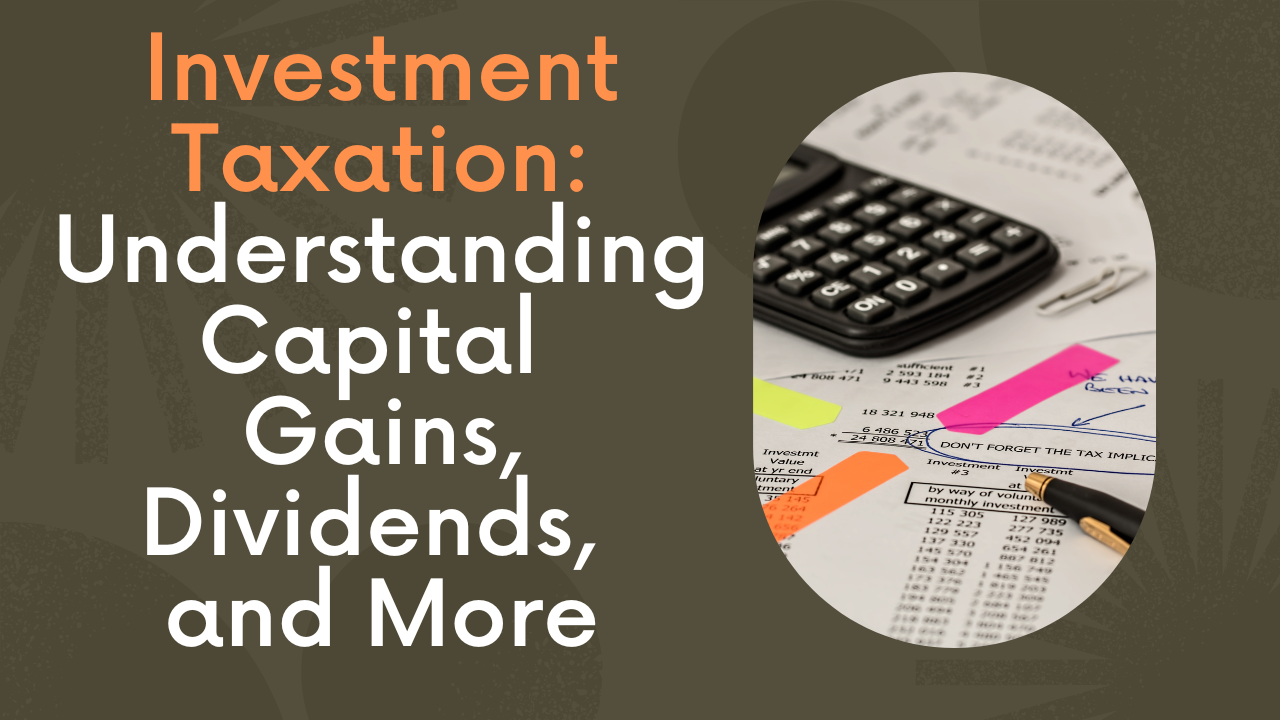Investing your money can be a great way to build wealth over time, but it’s important to understand the tax implications of your investments. When it comes to investment taxation, there are a lot of terms and concepts to know, from capital gains and dividends to tax brackets and basis.
Investment taxation is not limited to capital gains and dividends alone. It involves various intricate factors to take into account, including your tax bracket, the cost basis of your investments, and potential deductions or credits you may qualify for.

This article will take a deep dive into the intricate realm of investment taxation and delve into these topics in greater depth. We will elucidate the essential elements of investment taxation, including capital gains, dividends, and other relevant aspects, and furnish pragmatic pointers for managing your investments in a tax-efficient manner. Whether you are an experienced investor or a novice, comprehending investment taxation is crucial for establishing and safeguarding your wealth over the long haul.
Capital Gains
Comprehending how capital gains function is one of the crucial aspects of investment taxation. A capital gain is the profit realized when an asset is sold for more than its purchase price. For instance, if you buy a stock for $100 and sell it for $150, you have gained $50 in capital. Whether your capital gain is considered short-term or long-term depends on the duration for which you held the asset, and this can impact the tax amount you owe.
- Short-term capital gains: Short-term capital gains are those gained from selling an asset held for less than a year, and they are subject to taxation at the individual’s ordinary income tax rate, which can go up to 37% for the highest tax bracket.
- Long-term capital gains: Long-term capital gains originate from selling an asset that was held for more than a year and are taxed at a lower rate compared to short-term gains. The tax rates for long-term capital gains vary from 0% to 20%, based on the individual’s income level.
Dividends
Another key aspect of investment taxation is dividends. Dividends are payments made by companies to their shareholders, and they can be either qualified or non-qualified. Qualified dividends are taxed at a lower rate than non-qualified dividends, so it’s important to know the difference when investing.
- Qualified dividends: For dividends to qualify for the lower tax rate, they must meet specific requirements, such as being paid by a U.S. or qualified foreign corporation and meeting a minimum holding period. Qualified dividends are then taxed at the same rates as long-term capital gains.
- Non-qualified dividends: If your dividends don’t meet the criteria for qualified status, they are considered non-qualified and are taxed at your ordinary income tax rate.
Tax Brackets
Your tax bracket is another important factor to consider when it comes to investment taxation. Your tax bracket is determined by your income level, and it affects how much you owe in taxes on your capital gains and dividends.
2023 Tax Brackets
For the 2023 tax year, the tax brackets are as follows:
- 10% for incomes up to $10,950
- 12% for incomes between $10,951 and $45,700
- 22% for incomes between $45,701 and $117,000
- 24% for incomes between $117,001 and $190,000
- 32% for incomes between $190,001 and $341,050
- 35% for incomes between $341,051 and $433,000
- 37% for incomes over $433,000
Basis
The cost basis of your investments is another important factor to consider when it comes to investment taxation. Your cost basis is the original purchase price of an asset, and it affects how much you owe in taxes on your capital gains.
- Adjusted cost basis: Your cost basis may be adjusted over time due to factors such as stock splits, dividends reinvested, and brokerage fees. It’s important to keep track of your adjusted cost basis so you can accurately calculate your capital gains.
Deductions and Credits
Finally, it’s important to be aware of any deductions or credits you may be eligible for
when it comes to investment taxation. Deductions and credits can help reduce your overall tax bill, and they can be particularly useful if you have realized significant capital gains in a given year.
- Deductions: Deductions are expenses that you can subtract from your taxable income, which can help reduce your overall tax bill. Common deductions related to investments include investment interest expenses, advisory fees, and capital losses.
- Credits: Credits are dollar-for-dollar reductions in your tax bill, which can be particularly valuable. There are a variety of tax credits available to investors, such as the Retirement Savings Contributions Credit and the Saver’s Credit.
Also read:
The Future of Taxation: Trends, Challenges, and Opportunities Ahead
The Taxation of Cryptocurrency: What You Need to Know
Income Taxation 101: Understanding the Basics of How Taxes Work
Tax Planning Strategies for Small Business Owners and Individuals
FAQs
How would you define investment taxation?
Investment taxation pertains to the taxes imposed on the investment income earned by individuals or businesses, encompassing capital gains, dividends, and interest.
How would you describe capital gains?
Capital gains denote the earnings accrued from the sale of an investment, such as stocks or real estate, for a price higher than the purchase price.
How are capital gains taxed?
Capital gains attract different tax rates depending on the duration for which the investment was held prior to selling. Capital gains from investments held for one year or less, known as short-term capital gains, are subject to taxation at the individual’s regular income tax rate. On the other hand, long-term capital gains, which are from investments held for approx 1 year, attract lower tax rates than short-term gains, ranging from 0% to 20%.
What are dividends?
Dividends are payments made by a corporation to its shareholders, typically from the company’s profits.
How are dividends taxed?
The tax treatment of dividends is determined by their classification as qualified or non-qualified. If dividends are classified as qualified, they are taxed at the same rates as long-term capital gains. However, non-qualified dividends are taxed at the individual’s regular income tax rate.
Are there any tax advantages to investing in retirement accounts?
Yes, investing in retirement accounts such as 401(k)s and IRAs can offer significant tax advantages. Contributions to these accounts are made with pre-tax dollars, meaning that the contributions reduce the individual’s taxable income for the year. Additionally, investment earnings in these accounts are not taxed until they are withdrawn in retirement.
How would you define a capital loss?
A capital loss happens when an investment is sold for a lower price than the purchase price.
Is it possible to use capital losses to offset capital gains?
Yes, capital losses can be used to offset capital gains. If an individual’s capital losses exceed their capital gains for a given year, they can use up to $3,000 of the remaining losses to offset their regular income. Any unused losses can be carried forward to offset gains in the future.
What is a wash sale?
When an individual buys back an investment within 30 days before or after selling it at a loss, it is called a wash sale.
What are the tax implications of a wash sale?
The IRS disallows the loss from a wash sale, which means that the individual cannot use the loss to offset any capital gains. However, the disallowed loss is added to the cost basis of the repurchased investment, which can reduce the amount of future gains that will be taxed.
Conclusion
Understanding investment taxation is an important part of being a successful investor. By understanding concepts like capital gains, dividends, tax brackets, basis, and deductions/credits, you can make more informed investment decisions and minimize your tax bill. It’s important to consult with a tax professional to ensure you are taking advantage of all available tax strategies and staying in compliance with tax laws.



